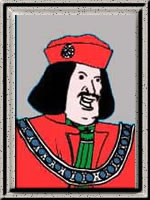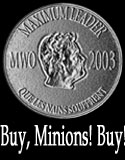Greetings, loyal minions. Your Maximum Leader wishes all of you who are Americans a Happy President’s Day. For those of you who are not Americans, your Maximum Leader hopes that this day is still treating you pretty well. Yes, this is day set aside by the Federal Government to give all Federal Employees (excluding active duty military) a day off to think about the Presidents of our great republic. Of course, if anyone who has the day off is thinking about Presdient’s Day at all they are likely either reading this blog, or thinking about buying something at a President’s Day sale.
Anyho… Last year, or the year before, your Maximum Leader gave you his list of the top 10 US Presidents ever. He’s decided to change the list a�d republish it. Here tis (changes in position are noted by each name):
1) George Washington. (No change) The first president, and the overriding shaper of the office. He set down many of the precedents that still function today. He established the cabinet system, and gave shape to the executive branch. He set down the major goals of US foreign policy (shunning entangling alliances) which held until (arguably) the Second World War. He also flexed (for the first time) federal supremacy over the states by putting down rebellions in Pennsylvania.
2) Abraham Lincoln. (No change) He saved the Union.
3) Franklin Roosevelt. (No change) Created the modern presidency (characterized by a strong executive). He also created the modern federal government (characterized by not only supreme federal authority but by an all-intrusive federal government).
4) James Knox Polk. (No change) Your Maximum Leader throws you a fastball here. He has always believed in the greatness of James K. Polk. Polk promised four things would be accomplished during his presidency. 1 - the Indian question in the south would be resolved; 2 - Texas would enter the Union; 3 - California would become part of the US; 4- a northern border with Canada west of the great lakes would be fixed. Polk said if these four things were not done in his four years, he would not seek another term. During his term he: sent the army in to round up and move the Indians in the south, he faught a war with Mexico and acquired Texas, California, and other western lands. He was (thanks to British/Canadian intransigence) unable to negotiate a northern border with Canada. He refused to run for a second term, and retired. (Your Maximum Leader will also add that he died shortly after leaving office - which your Maximum Leader also thinks is a generally good thing for ex-presidents to do.)
5) Theodore Roosevelt. (Number 6 last year) He started moving the nation towards global superpower status. Started necessary progressive changes and sensible regulation of the American economy.
6) Ronald Reagan. (Number 5 last year) He redefined the role of the modern federal government. (If you don’t think so, look at the administration of Bill Clinton and guess again.) And he won the Cold War. He was dropped by one position from last year due to his over-delegation of leadership in his second term - and the trouble it got him into.
7) Harry Truman. (Up from 8th last year) Had a tough act to follow, but did very well at it. Used the Bomb to end the war. Nationalized the Coal industry to break an illegal strike. Suddenly woke up and smelled the coffee concerning Soviet aggression and started defending US interests against communists.
 Andrew Jackson. (Down from 7th) The first populist president. First to utilize the presidential veto and thereby create the modern system by which laws are made in the US.
Andrew Jackson. (Down from 7th) The first populist president. First to utilize the presidential veto and thereby create the modern system by which laws are made in the US.
9) Thomas Jefferson. (No change) Overall he doesn’t score lots of points with your Maximum Leader for his presidency. But you have to give credit to him for the Louisiana Purchase.
10) John Adams. (New to list) John Adams supplants Lyndon B Johnson on the list this year. This is mostly as a result of your Maximum Leader re-reading David McCoullugh’s “John Adams” not too long ago. Although Adams’ presidency is not noteworthy for many reasons; Adams needs to be given credit for stepping aside peacefully when he lost the Election of 1800. Peaceful transition from one office-holder to another is a little-valued tendency in the US, Britain, Canada, Austrailia and Western Democracies. But it is one that should be given a little more attention.
If you care to debate these choices, your Maximum Leader is up to it.
This is Part 1 of what may be two or three posts today which are all variations on this theme…
Carry on.



